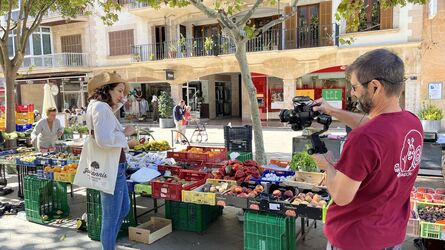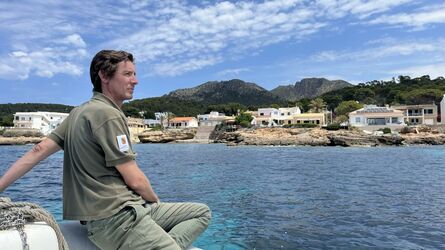With a series of video portraits, TV journalist Sibylle Tiessen takes us on a captivating journey into a world full of exciting projects, cultural diversity and authentic stories on Mallorca. Supported by TUI, the TUI Care Foundation and Majorca Daily Bulletin, viewers learn more about the island from a whole new perspective, from inspiring stories of locals to social, artistic, ecological, scientific and political aspects.
Episode 6: Casa Planas – Palma’s cultural centre with history
When artist Marina Planas talks about her family’s photo archive, you can clearly hear how proud she is of her grandfather’s cultural heritage. The Catalan photographer Josep Planas i Montanyà left his granddaughter a legacy: around three million photos and negatives as well as around 18,000 postcards are stored in the archive of the Casa Planas cultural centre in the Es Fortí district of Palma. Since 2016, this has been entirely in the care of his granddaughter Marina Planas, director of the cultural research centre. She has made it her main task to document the numerous photographs and negatives and to preserve them accordingly. The humid climate in Mallorca makes it difficult to store the antique photographic material properly.
Marina Planas’ grandfather founded his photography empire in Palma in 1940. “He also had a great influence on tourism with it," she explains. This is evidenced by various photographs that show the different and varied landscapes of the island. You can see deserted bays, popular beaches, lush orange and olive plantations and pictures of the old town of Palma. “My grandfather created the first photo postcards of the time and introduced colour photography to the Balearic Islands," Planas explains. All this led, among other things, to the island attracting more and more interest from foreign citizens. Over the course of time, the development of the island became visible in the photographs: Mallorca tourism boomed, foreign holidaymakers were photographed more and more often.
Today, Casa Planas serves not only as a photo archive. Over the years, it has become a cultural centre with 17 artists' studios, an event space and coworking opportunities and the most important photo archive in Europe. Since 2017, an international programme for artistic research residencies has been funded to revitalise the photo archive in an innovative way. Casa Planas works closely with the German Goethe-Institut.
Through her centre’s projects, Marina Planas hopes to preserve her grandfather’s cultural legacy in the future: “We will do everything we can to continue to protect this precious heritage.”
Find out more in the video:




 Austria
Austria



